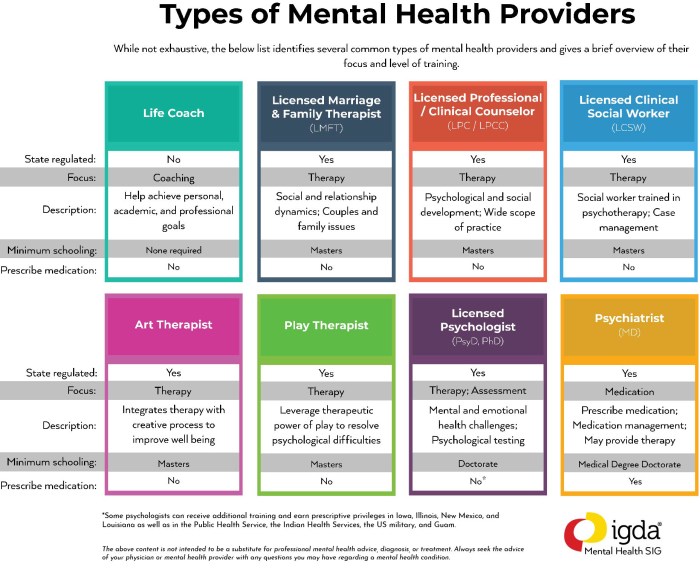
Embark on a journey into the realm of Mental Health Healthcare Providers, where we explore the nuances of access, costs, and the crucial role these professionals play in delivering quality care. Dive in to unravel the complexities of mental health care in a captivating narrative that sheds light on the challenges and triumphs of this vital healthcare sector.
Discover the key elements that shape the landscape of mental health care and the impact they have on patients, providers, and the healthcare system as a whole.
Healthcare Access
Easy access to mental health services is crucial for patients in need of support. It ensures timely intervention, proper management of conditions, and overall improved quality of life. Unfortunately, there are several barriers that prevent individuals from accessing the mental health care they require.
Barriers to Accessing Mental Health Care
- Lack of mental health professionals in certain areas, leading to long wait times for appointments.
- Stigma surrounding mental health, which can discourage individuals from seeking help.
- Financial constraints, as mental health services can be costly and not always covered by insurance.
- Lack of awareness about available resources and treatment options.
Impact of Limited Access on Patient Outcomes
Limited access to mental health care can have detrimental effects on patient outcomes. Without timely intervention and adequate support, individuals may experience worsening symptoms, decreased quality of life, and even increased risk of self-harm or suicide. It can also lead to higher rates of hospitalization and more severe mental health conditions in the long run.
Healthcare Costs
When it comes to seeking mental health treatment, patients often face significant financial challenges. This can include high out-of-pocket costs, limited insurance coverage, and the overall expense of therapy sessions and medication.
Cost Comparison of Different Mental Health Care Providers
There are various mental health care providers and services available, each with different costs associated. Here is a comparison of the costs of some common mental health care providers:
| Provider | Average Cost per Session |
|---|---|
| Psychiatrist | $100 – $300 |
| Psychologist | $80 – $200 |
| Therapist/Counselor | $50 – $150 |
Strategies to Make Mental Health Care More Affordable
- Look for providers who offer sliding scale fees based on income to make sessions more affordable for those with limited financial resources.
- Explore telehealth options, which can sometimes be more cost-effective than in-person visits.
- Consider group therapy sessions or community mental health centers, which may offer lower-cost alternatives to individual therapy.
- Check with your insurance provider to understand your coverage for mental health services and see if there are any affordable options available to you.
- Utilize employee assistance programs (EAPs) or mental health resources offered by your workplace for potential cost savings on therapy sessions.
Healthcare Providers
Healthcare providers play a crucial role in delivering effective care to individuals struggling with mental health issues. These professionals are trained to assess, diagnose, and treat a wide range of mental health conditions, providing support and guidance to patients in need.
Qualifications and Training
Mental health professionals, such as psychologists, psychiatrists, social workers, and counselors, undergo extensive education and training to become qualified in their respective fields. They typically hold advanced degrees and licenses, ensuring they have the knowledge and skills necessary to provide quality care to their patients.
Building Trust and Rapport
Building trust and rapport between healthcare providers and patients is essential for successful treatment outcomes. Patients are more likely to open up and engage in the therapeutic process when they feel a sense of trust and connection with their providers. This bond allows for effective communication, collaboration, and ultimately, better outcomes for the patient.
Health Insurance

Health insurance coverage plays a crucial role in determining access to mental health services for individuals. It can significantly impact the ability of patients to seek and afford necessary treatment for mental health conditions.
Impact of Health Insurance Coverage
When it comes to mental health coverage, patients often face common challenges that can hinder their access to care. Some of these challenges include:
- High out-of-pocket costs for mental health services, such as copayments and deductibles, which can make treatment unaffordable for many individuals.
- Limitations on the number of therapy sessions or psychiatric visits covered by insurance plans, leading to disruptions in continuity of care.
- Restrictive networks that may limit the choice of mental health providers available to patients, making it difficult to find a provider that meets their needs.
Improving Mental Health Coverage through Insurance Policies
There are several ways to enhance mental health coverage through insurance policies to better support individuals seeking treatment:
- Advocating for mental health parity laws that require insurance plans to cover mental health services at the same level as other medical services.
- Expanding coverage for telehealth services to increase access to mental health care, especially in underserved areas.
- Reducing barriers to care by eliminating prior authorization requirements for mental health treatment, ensuring timely access to needed services.
- Increasing transparency around mental health coverage, including details on benefits, provider networks, and costs, to help patients make informed decisions about their care.
Health Policies

Health policies play a crucial role in shaping the landscape of mental health care delivery. These policies dictate the framework within which mental health care providers operate, impacting access, quality of care, and overall patient outcomes.
Current Policies affecting Mental Health Care Delivery
- One current policy affecting mental health care delivery is the Mental Health Parity and Addiction Equity Act (MHPAEA). This federal law requires insurance plans to provide coverage for mental health and substance use disorders on par with coverage for physical health conditions.
- Another policy is the Affordable Care Act (ACA), which expanded access to mental health services by requiring insurance plans to cover mental health and substance use disorder services as essential health benefits.
- In addition, Medicaid expansion in certain states has increased access to mental health services for low-income individuals, leading to improved outcomes for this population.
Impact of Policy Changes on Mental Health Care Providers
- Policy changes can significantly impact mental health care providers by affecting reimbursement rates, administrative burdens, and patient caseloads. For example, changes in Medicaid reimbursement rates can influence providers’ ability to sustain their practices and serve vulnerable populations.
- Moreover, changes in documentation requirements and billing processes can increase administrative burden on providers, taking time away from direct patient care and contributing to burnout.
- Policy changes can also influence the availability of resources and support for mental health care providers, impacting their ability to deliver high-quality care to their patients.
Advocating for Improved Mental Health Policies
- Advocacy efforts at both the local and national levels are essential for improving mental health policies. Providers can engage in advocacy by participating in professional organizations, contacting legislators, and sharing their experiences with policymakers.
- Collaborating with other stakeholders, such as patients, families, and advocacy groups, can amplify the impact of advocacy efforts and bring about meaningful change in mental health policy.
- Educating the public about the importance of mental health and the need for supportive policies can also help garner support for initiatives aimed at improving mental health care delivery.
Health Records
Accurate and confidential mental health records are crucial for providing effective and personalized care to patients. These records contain vital information about a patient’s medical history, treatment plans, medications, and progress over time. Maintaining the confidentiality of these records is essential to build trust with patients and ensure their privacy is respected.
Importance of Accurate and Confidential Mental Health Records
Accurate mental health records help healthcare providers make informed decisions about diagnosis, treatment, and ongoing care. They provide a comprehensive view of a patient’s mental health journey, allowing for better coordination among healthcare professionals involved in their treatment.
Electronic Health Records in Mental Health Care Coordination
The adoption of electronic health records (EHRs) has revolutionized mental health care coordination by enabling secure and efficient sharing of patient information among different healthcare providers. EHRs allow for real-time updates, reduce errors in documentation, and improve communication between providers, leading to better outcomes for patients.
Best Practices for Maintaining Secure Mental Health Records
- Implement strict access controls: Limit access to mental health records to authorized personnel only.
- Encrypt data: Utilize encryption methods to protect patient information from unauthorized access.
- Regularly audit records: Conduct regular audits to ensure compliance with security protocols and detect any breaches.
- Train staff on data security: Provide training to staff members on the importance of maintaining confidentiality and security of mental health records.
- Backup data: Regularly backup mental health records to prevent data loss in case of system failures or cyberattacks.
Health Screening
Regular health screenings are essential in primary care settings to identify and address mental health conditions early on. Screening allows healthcare providers to detect issues before they escalate, leading to better outcomes for patients.
Comparison of Screening Tools
- The Patient Health Questionnaire-9 (PHQ-9) is a commonly used tool to screen for depression and assess its severity.
- The Generalized Anxiety Disorder 7-item (GAD-7) scale is another tool used to screen for anxiety disorders.
- The Columbia-Suicide Severity Rating Scale (C-SSRS) helps assess suicidal ideation and behavior.
Role of Early Detection
Early detection through screening plays a crucial role in improving mental health outcomes by enabling timely interventions. It allows for the implementation of appropriate treatment plans and support services, ultimately leading to better management of mental health conditions and overall well-being.
In conclusion, this exploration of Mental Health Healthcare Providers delves deep into the intricacies of delivering mental health care, highlighting the importance of accessibility, affordability, and provider-patient relationships. It’s a reminder of the ongoing efforts needed to enhance mental health services and support for those in need.
FAQ Explained
How can patients overcome barriers to accessing mental health care?
Patients can seek community resources, utilize telehealth services, or reach out to mental health advocacy organizations for support in navigating the system.
What are some strategies to make mental health care more affordable?
Some strategies include exploring sliding scale fees, seeking out non-profit mental health providers, and reviewing available insurance coverage options.
What qualifications and training are required for mental health professionals?
Mental health professionals typically need a master’s degree in psychology, counseling, or a related field, along with obtaining state licensure and completing supervised clinical hours.






